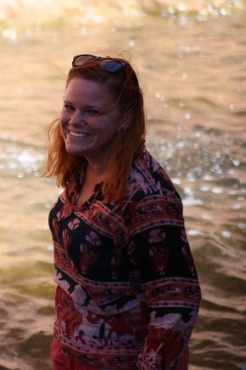Clare Maxwell is a senior peace, justice and conflict major.
Our washing machine, which I am sure is one of the few in the small town of Tazouta where I am living for service, hasn’t been working, so my host mother, Fatuma, decided to teach me the art of hand washing clothes. We put on our hankerchiefs – Tamazigh (Berber) women in rural Morocco rarely leave home without somehow covering their hair – and walk down to the Ain, the local mountain spring that serves as the main water source for the village.About a dozen other young women and girls are there when we show up, bending over their basins or standing knee deep in the rushing stream to rinse out their clothes. They are taking advantage of this rare escursion from their homes to catch up on the latest gossip. Nearby, a handful of young children are splashing each other in the shallow pool. Many of the women who live further away have come by donkey or mule, and the sounds of braying drown out the women’s chatter and the children’s shrieking. Some of Fatuma’s friends jump up to meet us as we arrive.The greeting is standard: one kiss on the right cheek, two kisses on the left cheek.
As we set into the washing, it becomes quite obvious that I’ve never done this before. I’m
sending suds flying with every scrub, and I’m covered in soapy water from head to foot. Some of the women giggle good-naturedly at my accent every time I attempt even the simplest phrase, like ‘Aiteenee al Saboon’ (pass me the soap). Twice, the current of the stream almost carries away a bit of clothing. More giggles.
Yet for all the teasing, I feel welcome in this odd little gathering of women. Fatuma and I giggle at two little boys trying to climb onto a donkey, and the women all smile and kiss me on the cheek when I introduce myself by my Tamazigh name: Aiyza. They tell me that my name is zweena (beautiful), and nod their approval that my hair is covered. When I lose a sock in the stream, another girl hops in to pull it out for me.
The whole process – scrubbing, rinsing, carrying our sopping wet laundry uphill to the house, and hanging everything out to dry – takes hours, and when we’re finally done, Fatuma beckons me into the kitchen to sit down for a minute and drink a glass of water.
“Aiyza, ya Aiyza’ she sings out half jokingly ‘ Inti Mra Tamazigheyya.” Aiyza, Aiyza, you are a Tamazigh woman.



